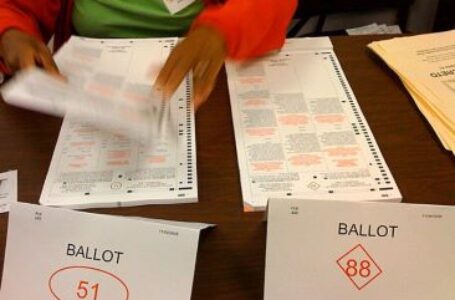Why Republicans are rallying against ‘woke’ ranked-choice voting

| July 03, 2021
Frustration over delays and tabulation mishaps in New York’s Democratic mayoral primary is fueling a wave of Republican opposition to an increasingly popular election structure change.
Arkansas Sen. Tom Cotton called it a “corrupt scam.” House Minority Leader Kevin McCarthy dinged it as “woke.” New York Republican Rep. Claudia Tenney argued that it “disenfranchises” voters.
Jason Snead, executive director of the conservative-leaning Honest Elections Project, said ranked-choice voting is a “solution in search of a problem.”
“It just makes the process more complex. It does not do anything to improve voter turnout or bolster voter confidence in the elections, and it is truly an unnecessary reform,” Snead added.
NYC ELECTION DISASTER COULD UNDERMINE DEMOCRATIC ARGUMENT FOR ELECTION OVERHAULS
Ranked-choice voting, also called an automatic runoff, is a system of relocating votes from bottom-tier candidates in races with at least three candidates to subsequent preferences until one candidate reaches at least 50% of the vote. According to FairVote, the system is used in two states, one county, 26 cities outside of Utah, and 23 Utah cities.
Advocates argue that ranked-choice voting could eliminate anger over the “spoiler effect” that independent candidates sometimes have and may lead to friendlier campaigning, as well as save money on runoff election costs. Most systems allow winners to be chosen with a simple plurality, though some systems, including Georgia’s, mandate runoff elections if no candidate wins a majority.
But in New York’s mayoral primary, a major test for the system, final results will not be known until weeks after the June 22 primary, and a mistaken counting of 135,000 test ballots temporarily led to a large discrepancy.
Democrats are not ready to blame the ranked-choice system solely for the mess. Democratic New York Rep. Alexandria Ocasio-Cortez recently told the Washington Examiner that the “incompetence of the New York City [Board of Elections] far predates ranked-choice voting.”
The snafu, though, prompted numerous Republicans to slam the system. Seeing Democrats squabble over election systems and admit poor election administration in their own stronghold helps Republicans point to their own arguments in favor of “election integrity” reforms that have become core conservative base issue in the aftermath of mass skepticism about whether the 2020 election was fair and accurate.
“New York’s unverified absentee ballot portal, lack of voter ID requirement and use of rank choice voting has led to yet another election marred by inaccurate counts,” Tenney, co-chairwoman of the House Election Integrity Caucus, said in a statement. “This is further shaking voter confidence, which is already at an all-time low.”
McCarthy went so far as to call ranked-choice voting “woke,” comparing it to a culture war issue.
“That race for mayor in New York, it’s a crime that we don’t know who won yet. Now they’ve gone so woke that it’s a ranked system that you can’t know for weeks on end,” House Minority Leader Kevin McCarthy said on a recent episode of the Megyn Kelly Show podcast. “Is there anything sacred in this country anymore that does not go woke? To our elections, that you can’t know when, who won, or how they won?”
ERIC ADAMS LEADS EARLY NYC MAYORAL RETURNS, BUT RANKED-CHOICE VOTING COULD SCRAMBLE RESULTS
McCarthy referenced a Maine Democrat, Rep. Jared Golden, who he said in his election “didn’t get the most votes. … This system is crazy.”
Golden, who defeated incumbent Maine Republican Rep. Bruce Poliquin in 2018, had won 45.6% in the first round of voting while Poliquin had 46.3%. But after ranked-choice preferences were tabulated and allocated, Golden won, with 50.6% of net third-round votes compared to 49.4% for Poliquin.
That reveals a more cynical reason Republicans could oppose the system change.
“Republicans believe that they benefit more from the status quo, and Democrats believe that these changes will help them,” said Kyle Kondik, the managing editor of Sabato’s Crystal Ball University of Virginia Center for Politics. “Democrats are just a lot more interested these days in various electoral process changes, be it nonpartisan redistricting commissions, ranked-choice voting, mail-in [or] early voting, and other things as compared to Republicans.”
The system doesn’t always work against Republicans, though.
Maine Republican Sen. Susan Collins was also thought to be at risk of being rolled by the state’s ranked-choice voting rules in her competitive 2020 race because two independent candidates were on the ballot. But Collins won nearly 51% of the vote on first-choice ballots, eliminating the need for any automatic runoff.
And Virginia Republicans in May utilized a type of ranked-choice voting system as a replacement for a statewide convention to nominate a 2021 statewide candidate due to the coronavirus pandemic preventing in-person convention rounds. That was only open to preregistered Republican delegates, though, and it was criticized by some candidates as being confusing and chaotic.
The confusion factor was the basis of a failed lawsuit that sought to block ranked-choice voting in New York’s elections.
Snead explained the augment: Ranked-choice voting “makes it harder for people with lower levels of education, lower English proficiency, to engage in the process.”
“And there’s some data to show that actually ranked-choice voting is another one of these sorts of voting reforms, along with other, you know, ‘convenience’ voting reforms, that don’t actually lead to higher turnout in elections and might actually deter people from voting,” he added.
Heritage Foundation legal fellow Hans von Spakovsky pointed out that in 2016, then-California Gov. Jerry Brown, a Democrat, vetoed a bill that would have expanded ranked-choice voting. Brown called the system “overly complicated and confusing,” and he argued that it “deprives voters of genuinely informed choice.”
CLICK HERE TO READ MORE FROM THE WASHINGTON EXAMINER
Cotton wrote in an op-ed last year that a ranked-choice voting system could fundamentally change how campaigns are run in crowded races.
That already had an effect in New York. Mayoral candidates Andrew Yang and Kathryn Garcia campaigned with each other just before the election, with Yang urging his supporters to make Garcia their No. 2 choices.
In a system without ranked-choice, those election-game decisions still play out, but they are left not to voters but to political insiders or candidates themselves. Several of the candidates hoping to unseat Republican Rep. Liz Cheney in next year’s primary, for instance, have indicated they will bow out of the race if they don’t have adequate support in order to prevent Cheney from winning with a plurality.
##
















